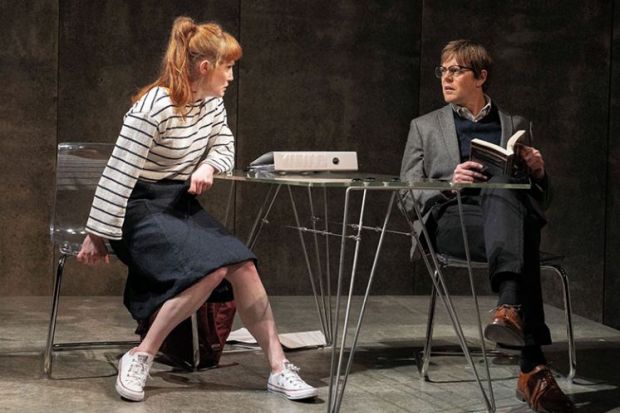“People are being shut down, vilified and ostracised for ideas that others don’t like – it’s not good,” reflected Ryan Craig on why he decided to set his latest play, Charlotte and Theodore, at a university.
“I’ve been a visiting lecturer, teaching playwriting, and I’ve noticed a creeping authoritarianism on what can be said – a sanctimony taking hold,” continued Mr Craig, a London-born dramatist known for tackling meaty issues in his plays, with works for the National Theatre exploring the impact of Israeli politics on British Jews (The Holy Rosenbergs) and the guilt of Holocaust survivors (Our Class).
Charlotte and Theodore, a two-hander starring Death in Paradise star Kris Marshall and Harry Potter and the Cursed Child’s Eve Ponsonby, is a more comedic affair centred on two married university philosophers, which debuted at Bath’s Ustinov Theatre before moving to Richmond Theatre and the Cambridge Arts Theatre.
With Mr Marshall, known for his youthful roles but now 50, playing the ageing professor to 32-year-old Ms Ponsonby’s rising star, the play evokes Willy Russell’s classic 1980s university-set comedy Educating Rita – since when British academia has largely been absent from the stage.
But the issues tackled in Charlotte and Theodore are distinctly modern: the “two-body problem” faced by married scholars, sexual harassment, identity politics and the perils of ill-tempered tweeting.
Cancel culture is another theme in the play: a high-profile debate with a right-wing intellectual is cancelled because of fears that it will generate bad publicity for the university.
“I’m from Generation X and liberal tolerance was our thing – that ideas mattered and could be debated. It feels this free exchange of ideas is being upended,” said Mr Craig.
The plot sees students demanding the sacking of Theodore over comments deemed offensive. Kathleen Stock’s departure from the University of Sussex, after protests about her gender-critical views, would seem an obvious source of inspiration.
But Mr Craig insisted that wasn’t the case. “That happened just after I’d finished the play, but it was the kind of thing that caused me to write it,” he continued. “Maybe Kathleen Stock was wrong, but we should be able to have those arguments – if people don’t like her views, then come up with better arguments,” he added.
For all the play’s polemics against shutting down debate on campus, Charlotte and Theodore also explores why such decisions might be taken for well-intentioned reasons. “In drama, you can never take an absolute position – people are living in liminal spaces between what is right and wrong,” said Mr Craig. “It feels more prescient than when I wrote it two years ago, but these issues are complicated, so having an equally – if not more – brilliant philosopher put the other side is a good way to approach this.”
In the case of the cancelled right-wing academic – a “free-speech martyr” – Charlotte argues how she would have “eviscerated” him, “demolished his arguments one by one”, and notes how “censorship becomes a habit”. The more career-minded Theodore puts the case against giving a platform to hate speech.
“You can’t really do that with a TV show,” said Mr Craig. “I’ve written for television and you’ve always got to keep the narrative moving forwards. With a play, people aren’t going anywhere so you take a bit more time to examine these things.”
While he enjoyed the Netflix series The Chair, one of the few recent dramas focused on academic life, “it pulled its punches” on some of the heavier issues regarding university life, argued Mr Craig, acknowledging the demands of the different mediums. “I wanted to explore what happens when you put people polarised by age, gender and ideas together – in this case, they’re also married – and ask how they get through this.”
Originally, the play was conceived as a broader farce with a wider range of characters. “The first draft had a dean of the school, the vice-chancellor and his wife – who was having an affair with a personal trainer. It was a slightly different play,” said Mr Craig.
But it was the two philosophers (“a Hegelian feminist and a Platonic relativist”) who stood out, leading Mr Craig to ditch the supporting cast for a fuller exploration of academia’s current challenges.
It’s a good time for a dramatist to tackle these issues, he said.
“We’re now in a world where the majority of young people are in higher education, which is a commercialised product – maybe I’m old-fashioned, but there will be problems when you take something that was rarefied and make it universal,” he added. “I don’t blame students for that – and a few have written to me saying how much they enjoyed the play.”
With Mr Craig keen to extend the play’s run, and the script due to be published shortly, Charlotte and Theodore might be sparking debates about modern academic life for some time to come.




